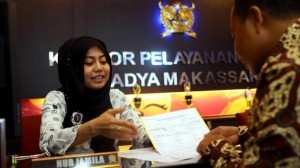Finance Ministry Simplifies Rules to Obtain Tax Restitution
 In order to support efforts to improve the ease of doing business and stimulate the countrys economy, the Government through the Ministry of Finance issued several new policies in the field of taxation and customs, which are expected to increase legal certainty, improve ease of doing business, and encourage the efficiency of tax administration.
In order to support efforts to improve the ease of doing business and stimulate the countrys economy, the Government through the Ministry of Finance issued several new policies in the field of taxation and customs, which are expected to increase legal certainty, improve ease of doing business, and encourage the efficiency of tax administration.
“The policy in taxation is set forth in the tax holiday policy, the acceleration of restitution. On the other hand, the commitment to simplifying the procedures on customs is set forth in the development of Bonded Logistics Center (PLB) Generation 2,” reads a press release from the Ministry of Finance on Monday (2/4).
According to the press release, the corporate taxpayer which invests in the pioneer industry may obtain a deduction of the Income Tax on the income from the principal business activity of 100 percent of the total corporate tax payable, with a term of 5 -20 years, for investments ranging from Rp500 billion to above Rp30 trillion.
“After the term ends, it will be given two years of transition period with a 50 percent reduction in Corporate Income Tax,” reads the press release.
In addition, the accelerated restitution policy is carried out by extending the criteria of taxpayers entitled to a preliminary refund of tax overpayments. Under the policy, payments eligible for restitution are accelerated by 900 percent, with a maximum refund value of Rp100 million for non-employee personal tax (formerly Rp10 million), a maximum restitution value of Rp1 billion for Income Tax of Corporate Taxpayer (formerly Rp100 million), and a maximum restitution value of Rp1 billion for VAT for Taxable Entrepreneur (formerly Rp100 million).
The simplification or acceleration of restitution is performed without examination but with simple research.
“The accelerated restitution policy is granted to Taxpayers who meet certain conditions (certain amount of restitution as mentioned above), certain criteria (obedient Taxpayers), and are low risk Taxable Entrepreneurs stipulated by the Minister of Finance,” reads the press release. Such policy on the acceleration of restitution is expected to decrease the cost compliance due to the provision of restitution without examination and it is expected that this policy can increase cash flow and economic liquidity.
Bonded Logistics Center
The press release also mentioned that the Ministry launched the development policy of Bonded Logistics Center (PLB), which since its launch on 10March 2016 has been assessed to provide many benefits such as improving the cost efficiency of logistics companies that impact on a decrease in dwelling time, an increase in company cash flow, a decrease in stockpiling costs (originally done overseas), as well as a decrease in technical search costs (which has to be done overseas).
Some of the cost efficiencies that have been generated, according to the press release, are the savings of lease hoards by heavy equipment importers reaching USD5.1 million per year, cutting freight costs from one PLB user (from 2-3 vessels to just 1 vessel), decreased storage costs, savings of goods storage costs by Rp7.18 million/container per three months, and removal of three warehouses from Singapore to Indonesia of 12,736 sqm by heavy equipment importers.
“In addition, the achievements of first-generation PLB from its occupancy rate have been full utilization, and lowered lead time to 1.62 days, inventories are piling up on PLB reaches USD2.6 billion and Singapore-based inventory stockpiled in PLB reaches USD606 million,” reads the press release.
In the future, the press release continued, through PLB Generation 2 policy launched on 27 March 2018, PLB will be developed into eight forms, namely Large Industry PLB, Small and Medium Industry PLB, Finished Goods PLB, e-commerce PLB, Basic Materials PLB, Hub Air Cargo PLB, Floating Storage PLB, and Commodity Exchange PLB.
In PLB policy, goods that are imported from foreign countries through the PLB status have not been considered imported ones; therefore, they have not been subject to import duties. The local products to be exported through PLB status have been considered exported goods.
“With the development of the forms of PLB, it is expected that more and more high potential can be achieved by PLB Generation 2,” reads the press release.
The aforementioned policies, according to the press release, are proof of the Government’s commitment to implement taxation and customs reforms including through a regulatory simplification, and increased synergies between work units that are expected to improve the efficiency and effectiveness of taxation and customs administration which in turn will improve Indonesias ease of doing business. (Ministry of Finance/ES)(MUR/MMB/YM/Naster).








